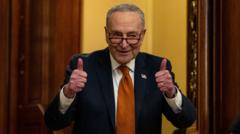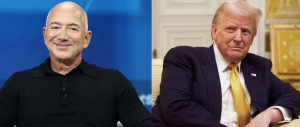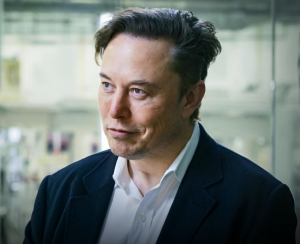As the competition heats up, Elon Musk's Starlink and Mukesh Ambani's Reliance Jio strategize to penetrate a market projected to reach two million subscribers by 2025. With the Indian government opting for administrative allocation of satellite spectrum rather than auctions, tensions are rising, placing both tycoons at odds over regulatory frameworks.
Musk and Ambani: The High-Stakes Contest for India's Satellite Internet Market

Musk and Ambani: The High-Stakes Contest for India's Satellite Internet Market
The rivalry between billionaires Elon Musk and Mukesh Ambani escalates as they vie for dominance in India's satellite broadband sector.
The battle for satellite internet supremacy in India is underway as two of the wealthiest individuals globally, Elon Musk and Mukesh Ambani, prepare to engage in a fierce competition for market share. Following India's recent government decision to allocate satellite spectrum for broadband services administratively, the atmosphere has become charged, intensifying the existing rivalry between the tech moguls.
Musk's Starlink, boasting 6,419 satellites in orbit and a strong subscriber base of four million globally, had originally faced regulatory delays in its attempts to enter the Indian market. With satellite broadband providing internet access in remote and rural areas where traditional options falter, the prospect of offering reliable connectivity is promising. There are expectations that the subscriber base for satellite internet in India could escalate to two million by 2025, as highlighted by credit rating agency ICRA.
Amid this backdrop, Mr. Ambani's Reliance Jio—enjoying substantial investments and strategic partnerships—emerges as a formidable player. Reliance's collaboration with Luxembourg-based SES Astra, which utilizes medium-Earth orbit (MEO) satellites, offers a competitive edge and cost-effective approach. Meanwhile, Musk's Starlink utilizes low-Earth orbit (LEO) satellites that facilitate faster internet service, thereby presenting unique advantages and challenges for both parties.
The crux of contention lies in the method of spectrum allocation. Musk criticized the auction model previously advocated by Ambani, prompting the government to choose an administrative approach, which officials claim aligns with international best practices. Administrative allocation is designed to facilitate fair distribution among qualified players, intending to open avenues for Starlink's entry. Conversely, Reliance insists that auctions are vital to ensure equitable competition and to avoid market distortion, citing a lack of clear legal guidelines for satellite broadband provision in India.
In light of Musk’s comments regarding spectrum designation by the International Telecommunication Union (ITU), his dealings with government regulations have captured significant attention. Following reports of Ambani's lobbying efforts to reconsider the allocation decision, Musk extended a proposal on social media, sparking further dialogue and contestation over the future market environment.
The mounting tension appears to be driven partly by the lucrative prospects of the vast Indian market, where approximately 40% of India's 1.4 billion residents remain offline. As a stark contrast, developed countries like China boast a high internet penetration with nearly 1.09 billion users. Analysts believe that if offered at competitive prices, satellite broadband can significantly advance internet access in underserved regions, ultimately benefiting the digital economy.
Pricing strategies will be crucial in this competitive arena, especially as Musk's Starlink faces the significant challenge of sustaining higher costs—reportedly up to ten times more than major Indian broadband services—without government subsidies. Industry experts predict that a "price war" is on the horizon, with Musk potentially leveraging his financial clout for promotional tactics to secure a foothold in the market.
Yet, skepticism remains about the viability of completely shifting from terrestrial to satellite networks, given that the latter generally incurs higher costs, particularly in densely populated urban settings. The competition between Musk and Ambani is not merely commercial but encompasses broader implications for the future of internet access in India, and thus, the battle is just beginning.
Musk's Starlink, boasting 6,419 satellites in orbit and a strong subscriber base of four million globally, had originally faced regulatory delays in its attempts to enter the Indian market. With satellite broadband providing internet access in remote and rural areas where traditional options falter, the prospect of offering reliable connectivity is promising. There are expectations that the subscriber base for satellite internet in India could escalate to two million by 2025, as highlighted by credit rating agency ICRA.
Amid this backdrop, Mr. Ambani's Reliance Jio—enjoying substantial investments and strategic partnerships—emerges as a formidable player. Reliance's collaboration with Luxembourg-based SES Astra, which utilizes medium-Earth orbit (MEO) satellites, offers a competitive edge and cost-effective approach. Meanwhile, Musk's Starlink utilizes low-Earth orbit (LEO) satellites that facilitate faster internet service, thereby presenting unique advantages and challenges for both parties.
The crux of contention lies in the method of spectrum allocation. Musk criticized the auction model previously advocated by Ambani, prompting the government to choose an administrative approach, which officials claim aligns with international best practices. Administrative allocation is designed to facilitate fair distribution among qualified players, intending to open avenues for Starlink's entry. Conversely, Reliance insists that auctions are vital to ensure equitable competition and to avoid market distortion, citing a lack of clear legal guidelines for satellite broadband provision in India.
In light of Musk’s comments regarding spectrum designation by the International Telecommunication Union (ITU), his dealings with government regulations have captured significant attention. Following reports of Ambani's lobbying efforts to reconsider the allocation decision, Musk extended a proposal on social media, sparking further dialogue and contestation over the future market environment.
The mounting tension appears to be driven partly by the lucrative prospects of the vast Indian market, where approximately 40% of India's 1.4 billion residents remain offline. As a stark contrast, developed countries like China boast a high internet penetration with nearly 1.09 billion users. Analysts believe that if offered at competitive prices, satellite broadband can significantly advance internet access in underserved regions, ultimately benefiting the digital economy.
Pricing strategies will be crucial in this competitive arena, especially as Musk's Starlink faces the significant challenge of sustaining higher costs—reportedly up to ten times more than major Indian broadband services—without government subsidies. Industry experts predict that a "price war" is on the horizon, with Musk potentially leveraging his financial clout for promotional tactics to secure a foothold in the market.
Yet, skepticism remains about the viability of completely shifting from terrestrial to satellite networks, given that the latter generally incurs higher costs, particularly in densely populated urban settings. The competition between Musk and Ambani is not merely commercial but encompasses broader implications for the future of internet access in India, and thus, the battle is just beginning.




















